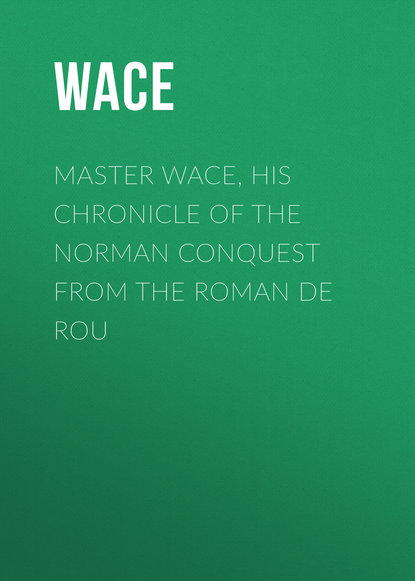 Полная версия
Полная версияMaster Wace, His Chronicle of the Norman Conquest From the Roman De Rou
The duke stood on a hill, where he could best see his men; the barons surrounded him, and he spoke to them proudly:
"Much ought I," said he, "to love you all, and much should I confide in you; much ought and will I thank you who have crossed the sea for me, and have come with me into this land. It grieves me that I cannot now render such thanks as are due to you, but when I can I will, and what I have shall be yours. If I conquer, you will conquer. If I win lands, you shall have lands; for I say most truly that I am not come merely to take for myself what I claim, but to punish the felonies, treasons, and falsehoods which the men of this country have always done and said to our people. They have done much ill to our kindred, as well as to other people, for they do all the treason and mischief they can. On the night of the feast of St Briçun, they committed horrible treachery; they slew all the Danes in one day; they had eaten with them, and then slew them in their sleep; no fouler crime was ever heard of than in this manner to kill the people who trusted in them.
"You have all heard of Alwered178, and how Godwin betrayed him; he saluted and kissed him, ate and drank with him; then betrayed, seized and bound him, and delivered him to the felon king, who confined him in the Isle of Eli, tore out his eyes, and afterwards killed him. He had the men of Normandy also brought to Gedefort179, and decimated them; and when the tenth was set apart, hear what felony they committed! they decimated that tenth once more, because it appeared too many to save. These felonies, and many other which they have done to our ancestors, and to our friends who demeaned themselves honourably, we will revenge on them, if God so please. When we have conquered them, we will take their gold and silver, and the wealth of which they have plenty, and their manors, which are rich. We shall certainly easily conquer them, for in all the world there is not so brave an army, neither such proved men and vassals, as are here assembled180."
Then they began to cry out, "You will not see one coward; none here will fear to die for love of you, if need be."
And he answered them, "I thank you well. For God's sake spare not; strike hard at the beginning; stay not to take spoil; all the booty shall be in common, and there will be plenty for every one. There will be no safety in peace or flight; the English will never love or spare Normans. Felons they were and are; false they were and false they will be. Shew no weakness towards them, for they will have no pity on you; neither the coward for his flight, nor the bold man for his strokes, will be the better liked by the English, nor will any be the more spared on that account. You may fly to the sea, but you can fly no further; you will find neither ship nor bridge there; there will be no sailors to receive you; and the English will overtake you and kill you in your shame. More of you will die in flight than in battle; flight, therefore, will not secure you; but fight, and you will conquer. I have no doubt of the victory; we are come for glory, the victory is in our hands, and we may make sure of obtaining it if we so please."
As the duke said this, and would have said yet more, William Fitz Osber rode up, his horse being all coated with iron181; "Sire," said he to his lord, "we tarry here too long, let us all arm ourselves. Allons! allons!"
Then all went to their tents and armed themselves as they best might; and the duke was very busy, giving every one his orders; and he was courteous to all the vassals, giving away many arms and horses to them.
When he prepared to arm himself, he called first for his good hauberk, and a man brought it on his arm, and placed before him; but in putting his head in, to get it on, he inadvertently turned it the wrong way, with the back part in front. He quickly changed it, but, when he saw that those who stood by were sorely alarmed, he said, "I have seen many a man who, if such a thing had happened to him, would not have borne arms, or entered the field the same day; but I never believed in omens, and I never will. I trust in God; for he does in all things his pleasure, and ordains what is to come to pass, according to his will. I have never liked fortune-tellers, nor believed in diviners; but I commend myself to our Lady. Let not this mischance give you trouble. The hauberk which was turned wrong, and then set right by me, signifies that a change will arise out of the matter we are now moving. You shall see the name of duke changed into king. Yea, a king shall I be, who hitherto have been but duke182."
Then he crossed himself, and straightway took his hauberk, stooped his head, and put it on aright; and laced his helmet and girt his sword, which a varlet brought him.
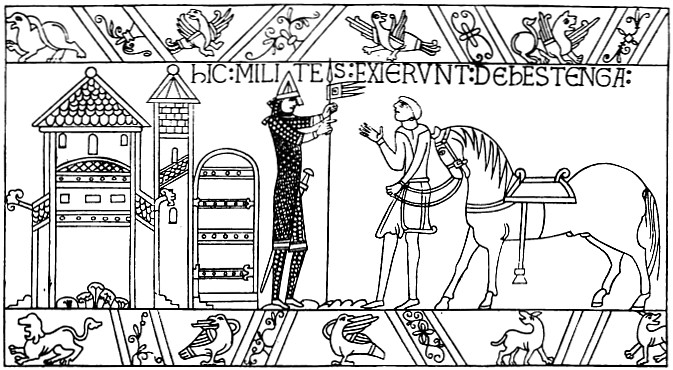
CHAPTER XVII.
WHO WAS CHOSEN TO BEAR THE DUKE'S GONFANON IN THE BATTLE
Then the duke called for his good horse; a better could not be found. It had been sent him by a king of Spain as a token of friendship183. Neither arms nor throng did it fear, when its lord spurred on. Galtier Giffart, who had been to St. Jago, brought it. The duke stretched out his hand, took the reins, put foot in stirrup and mounted; and the good horse pawed, pranced, reared himself up, and curvetted.
The viscount of Toarz saw how the duke bore himself in arms, and said to his people that were around him, "Never have I seen a man so fairly armed, nor one who rode so gallantly, or bore his arms, or became his hauberk so well; neither any one who bore his lance so gracefully, or sat his horse and manœuvred him so nobly. There is no other such knight under heaven! a fair count he is, and fair king he will be. Let him fight and he shall overcome; shame be to him who shall fail him!"
The duke called for horses, and had several led out to him; each had a good sword hanging at the saddlebow, and those who led the horses bore lances. Then the barons armed themselves, the knights and the lancemen184; and the whole were divided into three companies; each company having many lords and captains appointed to them, that there might be no cowardice, or fear of loss of member or life.
The duke called a serving man, and ordered him to bring forth the gonfanon which the pope had sent him; and he who bore it having unfolded it, the duke took it, reared it, and called to Raol de Conches185; "Bear my gonfanon," said he, "for I would not but do you right; by right and by ancestry your line are standard bearers of Normandy, and very good knights have they all been." "Many thanks to you," said Raol, "for acknowledging our right; but by my faith, the gonfanon shall not this day be borne by me. To-day I claim quittance of the service, for I would serve you in other guise. I will go with you into the battle, and will fight the English as long as life shall last, and know that my hand will be worth any twenty of such men."
Then the duke turned another way, and called to him Galtier Giffart186. "Do thou take this gonfanon," said he, "and bear it in the battle." But Galtier Giffart answered, "Sire, for God's mercy look at my white and bald head; my strength has fallen away, and my breath become shorter. The standard should be borne by one who can endure long labour; I shall be in the battle, and you have not any man who will serve you more truly; I will strike with my sword till it shall be died in your enemies' blood."
Then the duke said fiercely, "By the splendour of God187, my lords, I think you mean to betray and fail me in this great need." "Sire," said Giffart, "not so! we have done no treason, nor do I refuse from any felony towards you; but I have to lead a great chivalry, both soldiers and the men of my fief. Never had I such good means of serving you as I now have; and if God please, I will serve you: if need be, I will die for you, and will give my own heart for yours."
"By my faith," quoth the duke, "I always loved thee, and now I love thee more; if I survive this day, thou shalt be the better for it all thy days." Then he called out a knight, whom he had heard much praised, Tosteins Fitz Rou le blanc188, by name, whose abode was at Bec-en-Caux189. To him he delivered the gonfanon; and Tosteins took it right cheerfully, and bowed low to him in thanks, and bore it gallantly, and with good heart. His kindred still have quittance of all service for their inheritance on that account, and their heirs are entitled so to hold their inheritance for ever.
William sat on his warhorse, and called out Rogier, whom they call de Montgomeri190. "I rely much on you," said he; "lead your men thitherward, and attack them from that side. William, the son of Osber191, the seneschal, a right good vassal, shall go with you and help in the attack, and you shall have the men of Boilogne and Poix192, and all my soldiers193. Alain Fergant and Aimeri shall attack on the other side; they shall lead the Poitevins and the Bretons, and all the barons of Maine; and I with my own great men, my friends and kindred, will fight in the middle throng, where the battle shall be the hottest."
The barons and knights and lancemen194 were all now armed; the men on foot were well equipped, each bearing bow and sword: on their heads were caps195, and to their feet were bound buskins196. Some had good hides which they had bound round their bodies; and many were clad in frocks197, and had quivers and bows hung to their girdles. The knights had hauberks and swords, boots of steel and shining helmets; shields at their necks, and in their hands lances. And all had their cognizances[16], so that each might know his fellow, and Norman might not strike Norman, nor Frenchman kill his countryman by mistake. Those on foot led the way, with serried ranks, bearing their bows. The knights rode next, supporting the archers from behind. Thus both horse and foot kept their course and order of march as they began; in close ranks at a gentle pace, that the one might not pass or separate from the other. All went firmly and compactly, bearing themselves gallantly; and in each host stood archers ready to exchange shots.

CHAPTER XVIII.
HOW THE MEN OF ENGLAND MADE READY, AND WHO THEY WERE
Harold had summoned his men, earls, barons, and vavassors, from the castles and the cities; from the ports, the villages, and boroughs. The villains were also called together from the villages, bearing such arms as they found; clubs and great picks, iron forks and stakes. The English had enclosed the field where Harold was with his friends, and the barons of the country whom he had summoned and called together. Those of London had come at once, and those of Kent, of Herfort, and of Essesse; those of Surée and Sussesse, of St. Edmund and Sufoc; of Norwis and Norfoc; of Cantorbierre and Stanfort; Bedefort and Hundetone198 The men of Northanton also came; and those of Eurowic and Bokinkeham, of Bed and Notinkeham, Lindesie and Nichole. There came also from the west all who heard the summons; and very many were to be seen coming from Salebiere and Dorset, from Bat and from Sumerset. Many came too from about Glocestre, and many from Wirecestre, from Wincestre, Hontesire, and Brichesire; and many more from other counties that we have not named, and cannot indeed recount. All who could bear arms, and had learnt the news of the duke's arrival, came to defend the land. But none came from beyond Humbre, for they had other business upon their hands; the Danes and Tosti having much damaged and weakened them.
Harold knew that the Normans would come and attack him hand to hand: so he had early enclosed the field in which he placed his men. He made them arm early, and range themselves for the battle; he himself having put on arms and equipments that became such a lord. The duke, he said, ought to seek him, as he wanted to conquer England; and it became him to abide the attack, who had to defend the land. He commanded his people, and counselled his barons to keep themselves all together, and defend themselves in a body; for if they once separated, they would with difficulty recover themselves. "The Normans," said he, "are good vassals199, valiant on foot and on horseback; good knights are they on horseback, and well used to battle; all is lost if they once penetrate our ranks. They have brought long lances and swords, but you have pointed lances and keen edged bills200; and I do not expect that their arms can stand against yours. Cleave whenever you can; it will be ill done if you spare aught."
Harold had many and brave men that came from all quarters in great numbers; but a multitude of men is of little worth, if the favour of Heaven is wanting. Many and many have since said, that Harold had but a small force, and that he fell on that account. But many others say, and so do I, that he and the duke had man for man. The men of the duke were not more numerous; but he had certainly more barons, and the men were better. He had plenty of good knights, and great plenty of good archers.
The English peasants201 carried hatchets202, and keen edged bills203. They had built up a fence before them with their shields, and with ash and other wood; and had well joined and wattled in the whole work, so as not to leave even a crevice; and thus they had a barricade in their front, through which any Norman who would attack them must first pass. Being covered in this way by their shields and barricades, their aim was to defend themselves; and if they had remained steady for that purpose, they would not have been conquered that day; for every Norman who made his way in, lost his life in dishonour, either by hatchet or bill, by club or other weapon. They wore short204 and close hauberks, and helmets that over hung their garments205.
King Harold issued orders and made proclamation round, that all should be ranged with their faces toward the enemy; and that no one should move from where he was; so that whoever came might find them ready; and that whatever any one, be he Norman or other, should do, each should do his best to defend his own place. Then he ordered the men of Kent to go where the Normans were likely to make the attack; for they say that the men of Kent are entitled to strike first; and that whenever the king goes to battle, the first blow belongs to them. The right of the men of London is to guard the king's body, to place themselves around him, and to guard his standard; and they were accordingly placed by the standard, to watch and defend it.
When Harold had made all ready, and given his orders, he came into the midst of the English, and dismounted by the side of the standard, Leofwin and Gurth, his brothers, were with him; and around him he had barons enough, as he stood by his gonfanon, which was in truth a noble one, sparkling with gold and precious stones. After the victory William sent it to the apostle, to prove and commemorate his great conquest and glory. The English stood in close ranks, ready and eager for the fight; and they had moreover made a fosse, which went across the field, guarding one side of their army206.
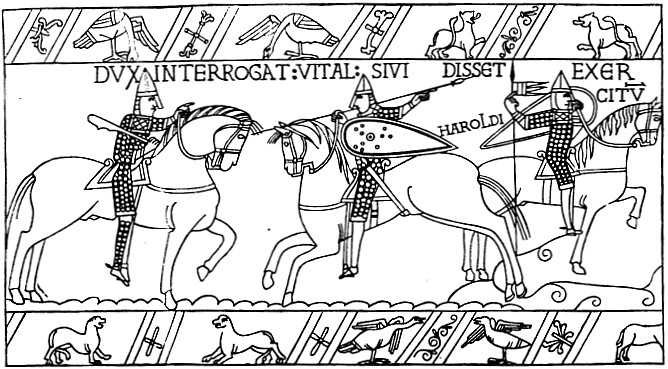
CHAPTER XIX.
HOW THE THREE NORMAN COMPANIES MOVED ON TO ATTACK THE ENGLISH
Meanwhile the Normans appeared, advancing over the ridge of a rising ground; and the first division of their troops moved onwards along the hill and across a valley. As they advanced king Harold saw them afar off, and calling to Gurth, said, "Brother, which way are you looking? See you the duke coining yonder? Our people will have no mischief from the force I see yonder. There are not men enough there to conquer the great force we have in this land. I have four times a hundred thousand armed men, knights and peasants."
"By my faith," answered Gurth, "you have many men; but a great gathering of vilanaille is worth little in battle. You have plenty of men in every day clothes, but I fear the Normans much; for all who have come from over sea are men to be feared. They are all well armed, and come on horseback, and will trample our people under foot; they have many lances and shields, hauberks and helmets; glaives and swords, bows and barbed arrows that are swift, and fly fleeter than the swallow."
"Gurth," said Harold, "be not dismayed, God can give us sufficient aid, if he so pleases; and there certainly is no need to be alarmed at yonder army."
But while they yet spoke of the Normans they were looking at, another division, still larger, came in sight, close following upon the first; and they wheeled towards another side of the field, forming together as the first body had done. Harold saw and examined them, and pointing them out to Gurth, said to him, "Gurth, our enemies grow; knights come up thickening their ranks; they gather together from all around; I am dismayed, and was never before so troubled: I much fear the result of the battle, and my heart is in great tribulation."
"Harold," said Gurth, "you did ill when you fixed a day for the battle. I lament that you came, and that you did not remain at London, or at Winchester: but it is now too late; it must be as it is."
"Sire brother," replied Harold, "bygone counsel is little worth; let us defend ourselves as we can; I know no other remedy."
"If," said Gurth, "you had stayed in London, you might have gone thence from town to town, and the duke would never have followed you. He would have feared you and the English, and would have returned or made peace; and thus you would have saved your kingdom. You would not believe me, nor value the advice I gave; you fixed the day of battle, and sought it of your own free will."
"Gurth," said Harold, "I did it for good; I named Saturday because I was born on a Saturday; and my mother used to tell me that good luck would attend me on that day."
"He is a fool," said Gurth, "who believes in luck, which no brave man ought to do. No brave man should trust to luck. Every one has his day of death; you say you were born on a Saturday, and on that day also you may be killed."
Meanwhile, a fresh company came in sight, covering all the plain; and in the midst of them was raised the gonfanon that came from Rome. Near it was the duke, and the best men and greatest strength of the army were there. The good knights, the good vassals and brave warriors were there; and there were gathered together the gentle barons, the good archers, and the lancemen, whose duty it was to guard the duke, and range themselves around him. The youths and common herd of the camp, whose business was not to join in the battle, but to take care of the harness and stores, moved off towards a rising ground. The priests and the clerks also ascended a hill, there to offer up prayers to God, and watch the event of the battle.
Harold saw William come, and beheld the field covered with arms, and how the Normans divided into three companies, in order to attack at three places. I know not of which he was most afraid; but his trouble was so great that he could scarcely say, "We are fallen on an evil lot, and I fear much lest we come to shame. The count of Flanders hath betrayed me: I trusted to him, and was a fool for so doing; when he sent me word by letter, and assured me by messages that William could never collect so great a chivalry. On the faith of his report I delayed my preparations, and now I rue the delay."
Then his brother Gurth drew near, and they placed themselves by the standard; each praying God to protect them. Around them were their kinsmen, and those barons who were their nearest friends; and they besought all to do their best, seeing that none could now avoid the conflict. Each man had his hauberk on, with his sword girt and his shield at his neck. Great hatchets were also slung at their necks, with which they expected to strike heavy blows. They were on foot in close ranks, and carried themselves right boldly; yet if they had foretold the issue, well might they have bewailed the evil fate—cruel and hard of a truth—that was approaching. OLICROSSE207 they often cried, and many times repeated GODEMITE208. 'Olicrosse' is in English what 'Sainte Croix' is in French, and 'Godemite' the same as 'Dex tot poissant' in French.
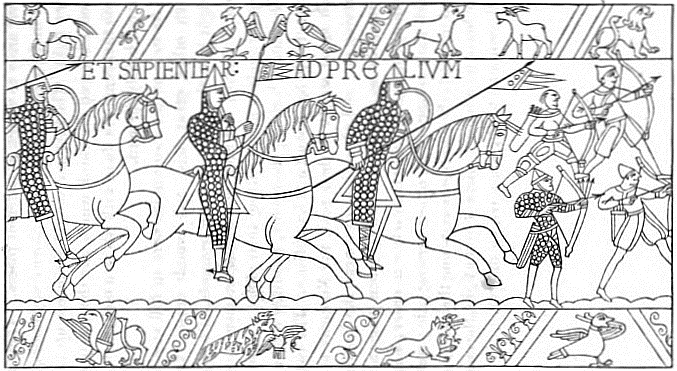
The Normans brought on the three divisions of their army to attack at different places. They set out in three companies, and in three companies did they fight. The first and second had come up, and then advanced the third, which was the greatest; with that came the duke with his own men, and all moved boldly forward.
As soon as the two armies were in full view of each other, great noise and tumult arose. You might hear the sound of many trumpets, of bugles and of horns; and then you might see men ranging themselves in line, lifting their shields, raising their lances, bending their bows, handling their arrows, ready for assault and for defence. The English stood steady to their post, the Normans still moving on; and when they drew near, the English were to be seen stirring to and fro; men going and coming; troops ranging themselves in order; some with their colour rising, others turning pale; some making ready their arms, others raising their shields; the brave man rousing himself to the fight, the coward trembling at the approaching danger.
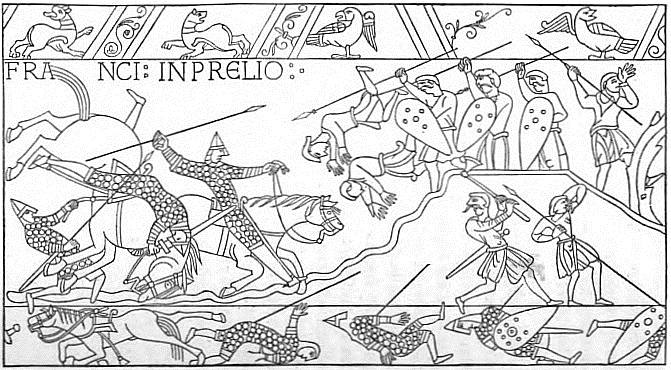
CHAPTER XX.
HOW TAILLEFER SANG, AND THE BATTLE BEGAN
Then Taillefer209 who sang right well, rode mounted on a swift horse before the duke, singing of Karlemaine, and of Rollant, of Oliver and the vassals who died in Renchevals210. And when they drew nigh to the English, "A boon, sire!" cried Taillefer; "I have long served you, and you owe me for all such service. To-day, so please you, you shall repay it. I ask as my guerdon, and beseech you for it earnestly, that you will allow me to strike the first blow in the battle!"
And the duke answered, "I grant it." Then Taillefer put his horse to a gallop, charging before all the rest, and struck an Englishman dead, driving his lance below the breast into his body, and stretching him upon the ground211. Then he drew his sword, and struck another, crying out "Come on! come on! What do ye, sirs? lay on! lay on!" At the second blow he struck, the English pushed forward and surrounded him212. Forthwith arose the noise and cry of war, and on either side the people put themselves in motion. The Normans moved on to the assault, and the English defended themselves well. Some were striking, others urging onwards; all were bold, and cast aside fear.
AND NOW, BEHOLD! THAT BATTLE WAS GATHERED WHEREOF THE FAME IS YET MIGHTY.
Loud and far resounded the bray of the horns; and the shocks of the lances; the mighty strokes of clubs, and the quick clashing of swords. One while the Englishmen rushed on, another while they fell back; one while the men from over sea charged onwards, and again at other times retreated. The Normans shouted DEX AIE, the English people UT213. Then came the cunning manœuvres, the rude shocks and strokes of the lance and blows of the sword, among the Serjeants and soldiers, both English and Norman. When the English fall, the Normans shout. Each side taunts and defies the other, yet neither knoweth what the other saith; and the Normans say the English bark, because they understand not their speech.
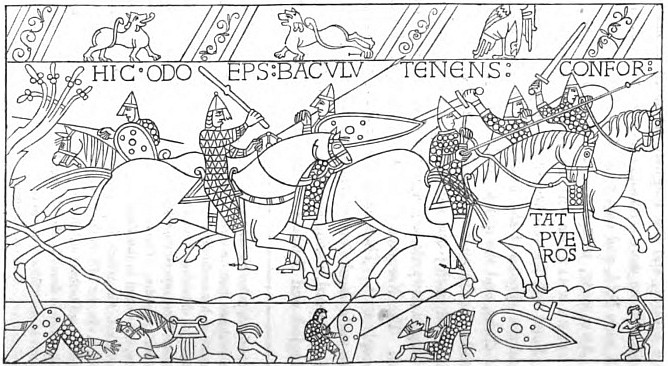
Some wax strong, others weak; the brave exult, but the cowards tremble, as men who are sore dismayed. The Normans press on the assault, and the English defend their post well; they pierce the hauberks, and cleave the shields; receive and return mighty blows. Again some press forwards; others yield, and thus in various ways the struggle proceeds.
In the plain was a fosse214, which the Normans had now behind them, having passed it in the fight without regarding it. But the English charged and drove the Normans before them, till they made them fall back upon this fosse, overthrowing into it horses and men. Many were to be seen falling therein, rolling one over the other, with their faces to the earth, and unable to rise. Many of the English also, whom the Normans drew down along with them, died there. At no time during the day's battle did so many Normans die, as perished in that fosse. So those said who saw the dead.



